Custom In Vietnam: A deep dive into Vietnamese traditions
Vietnam is a country where tradition and modernity blend seamlessly, where traditional customs and modern living harmonize perfectly throughout Vietnam while ancient cultural practices continue influencing daily life and following proper social etiquette mirrors the complexity of silk embroidery. Anyone traveling to Vietnam or planning relocation there or wanting to learn about Vietnamese culture must grasp the traditional customs of the nation.
The customs of Vietnam result from a harmonious combination of Confucianism and local traditions together with Buddhism through elaborate Lunar New Year (Tet) rituals and deep-rooted elder respect. This comprehensive guide provides all the knowledge needed to master Vietnamese customs which will help you navigate through the country confidently and demonstrate respect to local people while potentially winning their admiration.
Drinking a cup of Vietnamese iced coffee allows us to begin our cultural exploration of custom in Vietnam.
Family values in Vietnamese society: The importance of family hierarchy
In Vietnam, family is everything. The Vietnamese cultural tradition places stronger emphasis on family connections and social ranks than the Western concept which values independence. According to Vietnamese cultural norms younger household members need to show respect and follow commands from their senior family members.
The eldest child receives more responsibilities than others but the youngest receives the most attention. Family members frequently meet up and all major life choices from marrying to career shifts to real estate acquisitions need family authorization.
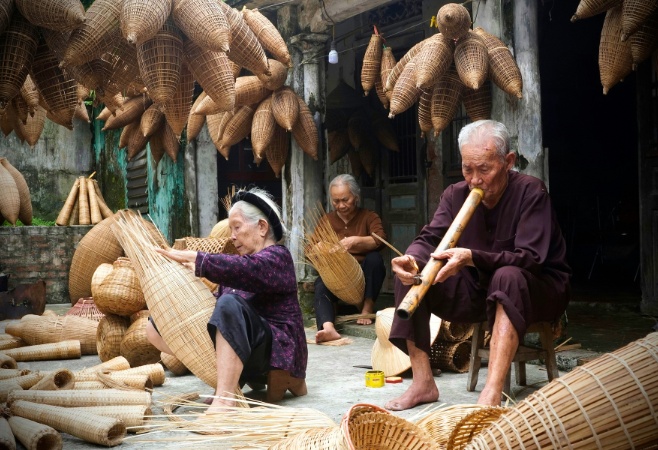
Family values in Vietnamese society
Filial piety: Respect for elders
Vietnamese culture teaches its citizens to care for their parents by keeping them in multi-generational family residences. Many Vietnamese view sending elderly parents to nursing homes as a breach of respect. Children receive the expectation to offer both emotional and financial help and physical support to their parents as they grow older.
Arranged marriages and family influence
Modern couples scarcely practice arranged marriages but family approval dominates their decision-making regarding romantic relationships. A serious commitment signal exists when your Vietnamese partner pushes to introduce you to their parents during the early stages of your relationship.
Greetings and social etiquette
Bowing, handshakes or both?
Greetings in Vietnam depend on context and formality.
- Formal settings: A slight bow with a handshake.
- Casual settings: A friendly nod or a simple "Chào" (Hello).
- Elders: Always greet them first, using respectful titles like "Bác" (Uncle/Aunt), "Ông" (Grandfather) or "Bà" (Grandmother).
How to address people correctly
A Vietnamese naming system consists of three parts which start with the family name followed by the middle name and ending with the given name. A proper title selection holds significant importance in all situations. When addressing others in Vietnam, use their title before their first name:
- Anh (Older Brother) / Chị (Older Sister) for colleagues or acquaintances.
- Thầy (Teacher) / Cô (Madam) for teachers and respected individuals.
- Ông / Bà for elders.
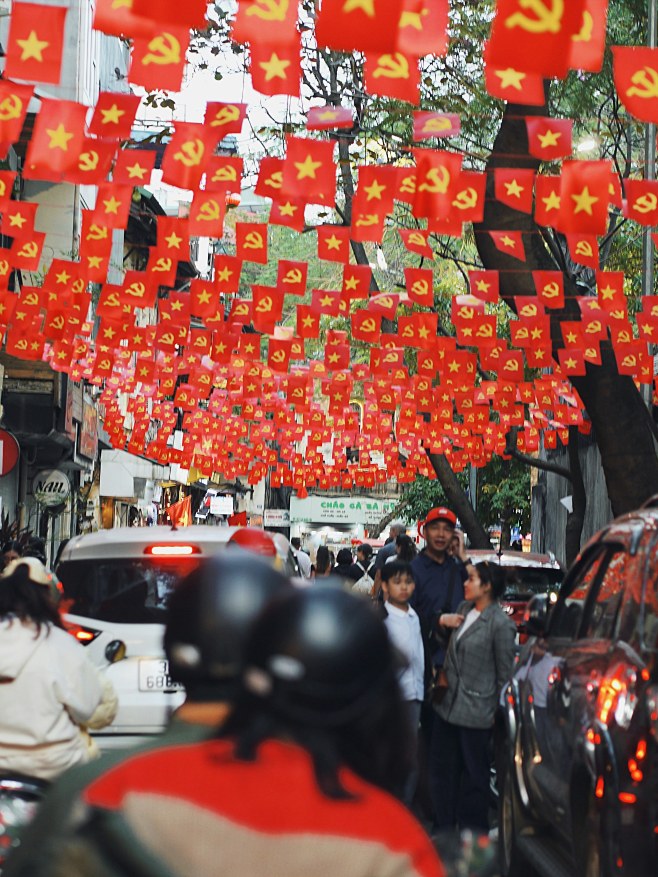
Tet in Ha Noi Old Quater
Gift-giving traditions
Gift-giving is an essential custom in Vietnam, but there are rules:
- Good gifts: Fruits, tea, wine or symbolic gifts like red envelopes (for lucky money).
- Avoid black or white wrapping: These colors symbolize funerals.
- Don’t give a clock or a watch: It symbolizes counting down one’s life.
Dining customs and table manners
How to use chopsticks without offending anyone
If you’re dining in Vietnam, chopsticks are your best friends - until they’re not. Never:
- Stick chopsticks upright in a bowl of rice (it resembles incense for the dead).
- Point chopsticks at someone (it’s considered rude).
The art of sharing food
Vietnamese meals are communal and dishes are meant to be shared. Unlike Western dining, where everyone has their own plate, Vietnamese meals involve passing dishes around.
Slurping: Rude or a compliment?
Good news! Slurping soup or noodles isn’t frowned upon—it’s actually encouraged. It shows you’re enjoying the meal!
Festivals and celebrations in Vietnam
Tet (Lunar New Year) and its importance
In Vietnam, Tet represents the biggest annual festival since it signals the Lunar New Year beginning. Traditions include:
- The tradition of household cleaning functions to discard negative fortune.
- People distribute "Lì xì" lucky money gifts to both children and older generations.
- Visiting temples for good fortune.
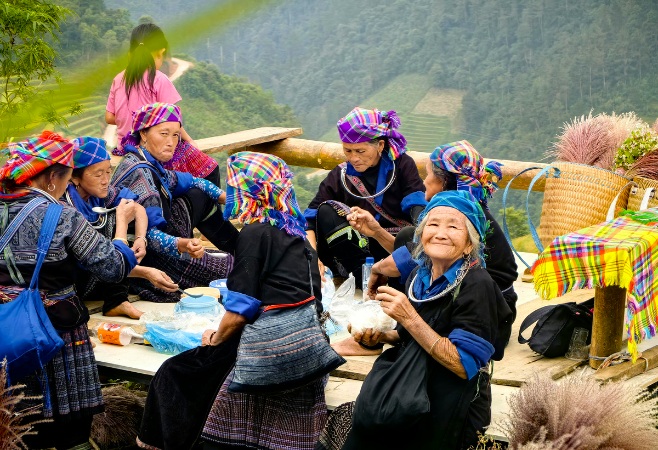
Festivals and celebrations in Vietnam
Mid-Autumn festival: A time for the Moon
People celebrate this festival through mooncake sharing and lantern displays while enjoying traditional lion dances which children love.
The Hungry Ghost Festival
Families participate in this festival by offering food to wandering spirits to stop their harmful activities.
Wedding customs in Vietnam
The role of the matchmaker
Traditionally matchmakers served an essential role in arranging marriages through Vietnamese traditional practices. Family approval holds substantial importance for modern Vietnamese couples even though love marriages have become widespread.
Traditional wedding attire
The Ao dai (Vietnamese traditional dress) is worn by the bride and groom. Bright red is the preferred color for good luck.
The tea ceremony and its meaning
A crucial part of the wedding, the tea ceremony symbolizes respect and gratitude towards the couple’s families.
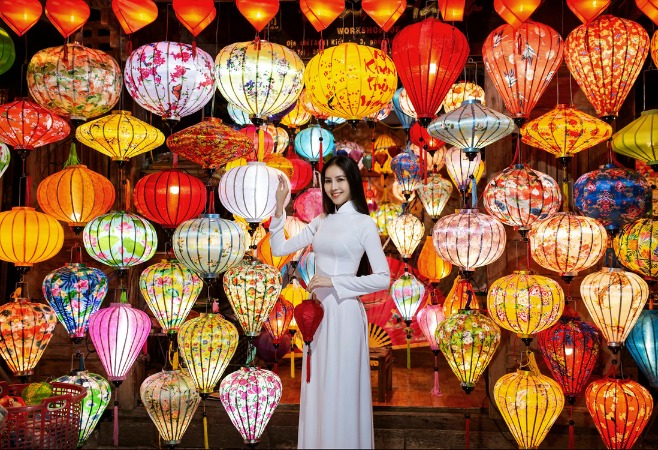
Customs in Vietnam
Superstitions and beliefs
Lucky and unlucky numbers
- Lucky numbers: 6, 8 and 9 (associated with prosperity and longevity).
- Unlucky number: 4 (sounds like "death" in Vietnamese).
The influence of feng shui
Many Vietnamese consult feng shui masters when building houses or opening businesses.
Ghost stories and the spirit world
Vietnamese folklore is full of ghost stories! Many locals believe in spirits and ghosts and avoiding haunted places at night is common advice.
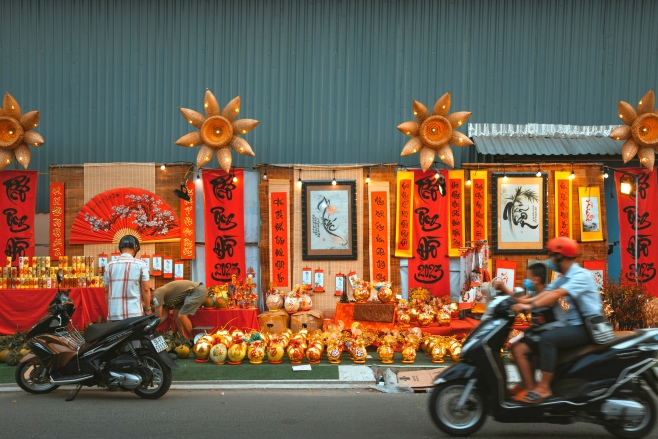
Superstitions and beliefs in Vietnam
FAQs about custom in Vietnam
- Why do Vietnamese people take off their shoes indoors?
Shoes represent both cleanliness and respect by Vietnamese people because they transport dirt along with negative energy.
- Is it rude to refuse food in Vietnam?
Yes! You should accept any food offer by taking only a small portion of it.
- What are the most important Vietnamese festivals?
Tết (Lunar New Year), Mid-Autumn Festival and Hung Kings’ Festival.
- How should foreigners behave in a Vietnamese home?
Small gifts along with shoe removal and elder greeting form the correct way to enter a Vietnamese home.
- Do Vietnamese people believe in ghosts?
Absolutely! People stay away from nighttime whistling because they think it brings spirits to them.
- What’s the best way to greet someone in Vietnam?
People usually respond well to both a polite nod and a friendly "Chào".
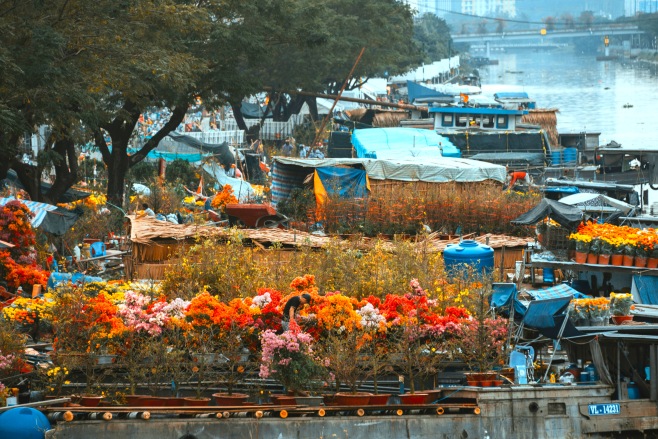
Flowers in Tet Vietnam
Conclusion: Custom in Vietnam
Traditional Vietnamese customs base themselves on community values alongside respect and traditional practices. Understanding Vietnamese customs will make your social interactions smoother because they matter in various everyday situations from dining at home to attending weddings or meeting people outdoors.
Related Articles
- Grab and Taxi in Vietnam: Best transport options for visitors
- Ha Giang in Vietnam: Breathtaking loops & nature’s majesty
- Bun Cha Hanoi – Authentic Taste of Vietnam’s Iconic Dish
- Custom In Vietnam: A deep dive into Vietnamese traditions
- Retire in Vietnam: The ultimate guide for a dream retirement
- Trang An, Vietnam: A journey through Vietnam's natural wonder
- Vietnam Metro: The future of urban transportation in Vietnam
- Main districts of Ho Chi Minh city: Iconic landmarks & travel map
HOW CAN WE HELP?
APPLY WITH CONFIDENCE










